While policymakers argue over whether abortion should be a right or a crime, the public has a clear policy stance on the matter. A new survey in the six swing states finds that majorities of Republicans and Democrats oppose criminalizing abortion before fetal viability.
Furthermore, bipartisan majorities favor reducing unintended pregnancies and abortions through policies ensuring access to birth control.
This survey by the University of Maryland’s Program for Public Consultation is the fifth in the Swing Six Issue Surveys series, being conducted in the run-up to the November election in six swing states, and nationally, on major policies. Unlike traditional polls, respondents in a public consultation survey go through an online “policymaking simulation” in which they are provided briefings and arguments for and against each policy. Content is reviewed by experts on different sides of the issues to ensure accuracy and balance.
Criminalizing abortion
Large bipartisan majorities in every swing state do not want abortion to be criminalized before fetal viability (73 percent to 80 percent), including Republicans (57 percent to 70 percent) and Democrats (83 percent to 93 percent), as well as 77 percent nationally.
Before making their decision, respondents were informed that criminalizing abortion means prison time or fines for the doctor or the woman. After evaluating strong arguments for and against criminalizing abortion, respondents could choose to make abortion a crime 1) at all stages of pregnancy, 2) only after 15 weeks, 3) only after fetal viability (22-24 weeks), or 4) not make abortion a crime at any stage of pregnancy.
In Arizona and Nevada, there will be measures on the 2024 ballot to prevent the government from criminalizing abortion before fetal viability. In both states, bipartisan majorities of 80 percent do not want abortion to be a crime before viability, including seven in 10 Republicans and nine in 10 Democrats.
Smaller but still robust majorities go further and oppose criminalizing abortion at any stage of pregnancy: 61 percent to 70 percent in the swing states, including large majorities of Democrats (73 percent to 85 percent) and small majorities of Republicans in Arizona, Michigan and Nevada (52 percent to 55 percent). Among Republicans in Georgia, Pennsylvania and Wisconsin, it is less than half (41 percent to 48 percent). Nationally, two-thirds take this position, including eight in 10 Democrats and half of Republicans.
Support for criminalizing abortion at all stages of pregnancy is just 7 percent to 13 percent in the swing states, including just 10 percent to 25 percent of Republicans and 3 percent to 7 percent of Democrats. Nationally, support is just 11 percent (Republicans, 19 percent; Democrats 5 percent).
Public overestimation of support for criminalizing all abortions
Respondents were asked to estimate what percent of Americans support criminalizing abortion at all stages of pregnancy. In all swing states and nationally, the majority estimated 35 percent or more. The actual level of support for that policy is just 11 percent nationally.
Making abortion law federal or leaving it up to states
After choosing which abortion law they favor, respondents were asked whether they want their preferred option to be a federal law that applies nationwide, or only the law in their own state with every other state able to have their own law.
Large majorities in every swing state favor having a federal law (68 percent to 73 percent). This includes majorities of Republicans in five of the swing states (58 percent to 66 percent), but just under half in Nevada (48 percent) — an 18-point spread across states. Among Democrats in the swing states, 76 percent to 87 percent want a federal law. Nationally, 70 percent take this position (Republicans, 56 percent; Democrats, 82 percent).
Majorities nationally support a federal law irrespective of their preference for what the law should be. This includes the full range from those who want to criminalize abortion at any stage of pregnancy to those who oppose any criminalization.
Ensuring access to birth control
Policies that seek to reduce unintended pregnancies and abortions through access to birth control receive large majority support among Republicans and Democrats in every swing state, and nationally.
Requiring all public schools to provide education about birth control is supported by 80 percent to 84 percent in the swing states, including Republicans (74 percent to 80 percent) and Democrats (86 percent to 93 percent), as well as 80 percent nationally.
Ensuring nationwide access to birth control, by prohibiting state governments from restricting or banning birth control, is supported by 80 percent to 85 percent in the swing states, including Republicans (71 percent to 81 percent) and Democrats (86 percent to 93 percent), as well as 81 percent nationally.
Continuing the Affordable Care Act mandate — that most insurance plans cover long-term birth control, such as the pill and IUDs — is supported by 85 percent to 90 percent in the swing states, including Republicans (76 percent to 87 percent) and Democrats (91 percent to 96 percent), as well as 85 percent nationally.
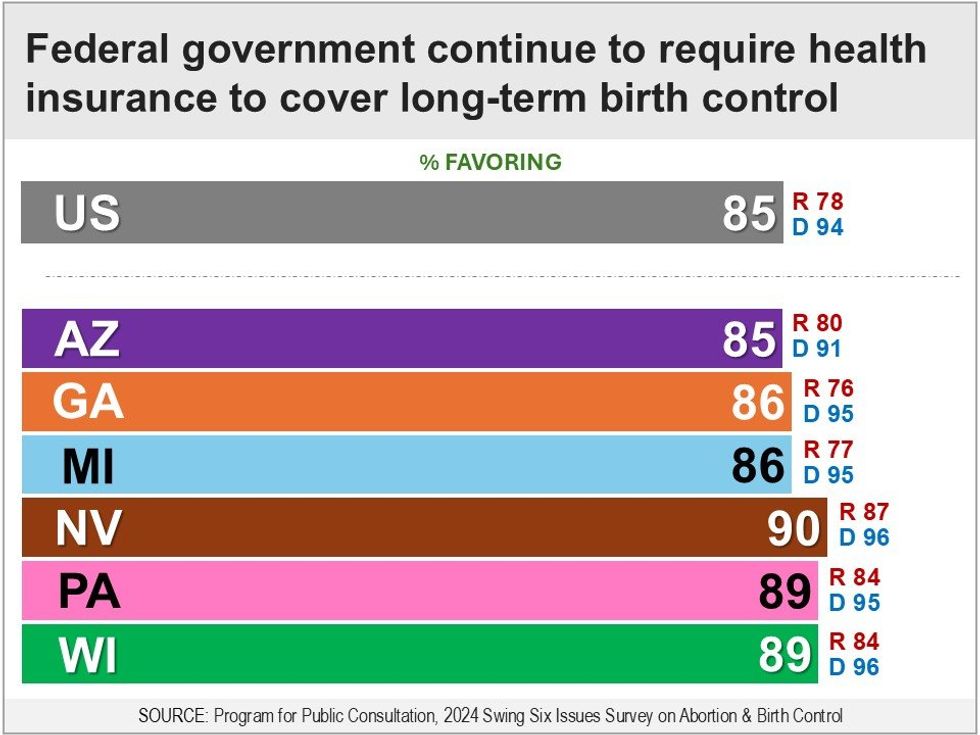 Program for Public Consultation, 2024 Swing Six Issues Survey on Abortion & Birth Control
Program for Public Consultation, 2024 Swing Six Issues Survey on Abortion & Birth Control
Increasing funding for health care clinics so they can provide long-term birth control for free or at a low cost is supported by 78 percent to 80 percent in the swing states, including 66 percent to 71 percent of Republicans and 88 percent to 93 percent of Democrats, as well as 76 percent nationally.
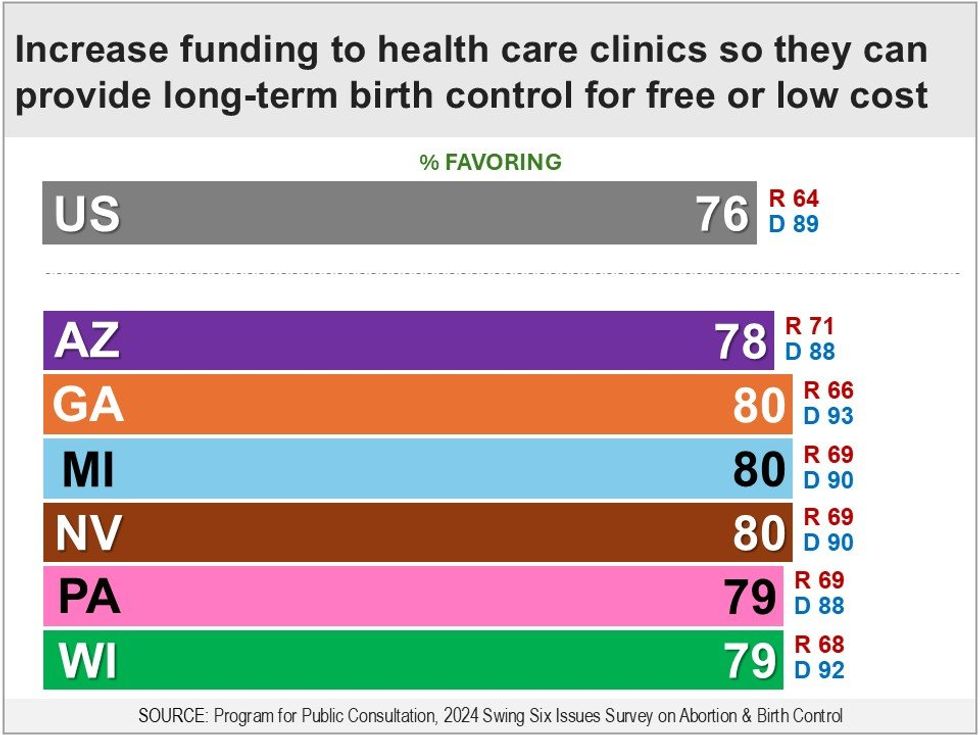 Program for Public Consultation, 2024 Swing Six Issues Survey on Abortion & Birth Control
Program for Public Consultation, 2024 Swing Six Issues Survey on Abortion & Birth Control
“Large bipartisan majorities want to greatly limit the role of government when it comes to abortion, but they do want the government to actively ensure access to birth control,” said Steven Kull, director of the Program for Public Consultation.
Trying to reduce abortions through mandatory ultrasounds and waiting periods
Respondents were asked about methods for trying to reduce abortions by putting more requirements on the process of getting an abortion, as has been done in several states. Views vary across the swing states, with less than half in support nationally. Majorities of Republicans are generally in support, while majorities of Democrats are opposed.
Requiring doctors to show an ultrasound of the fetus to the woman before providing the abortion is supported by a majority only in Georgia (57 percent) and, barely, in Wisconsin (51 percent), and by less than half in Arizona, Michigan, Nevada and Pennsylvania (44 percent to 46 percent). Among Republicans in the swing states, 52 percent to 66 percent are in favor, while among Democrats just 26 percent to 49 percent are in favor. Nationally, 48 percent favor this requirement (Republicans, 60 percent; Democrats, 36 percent), while 52 percent oppose it.
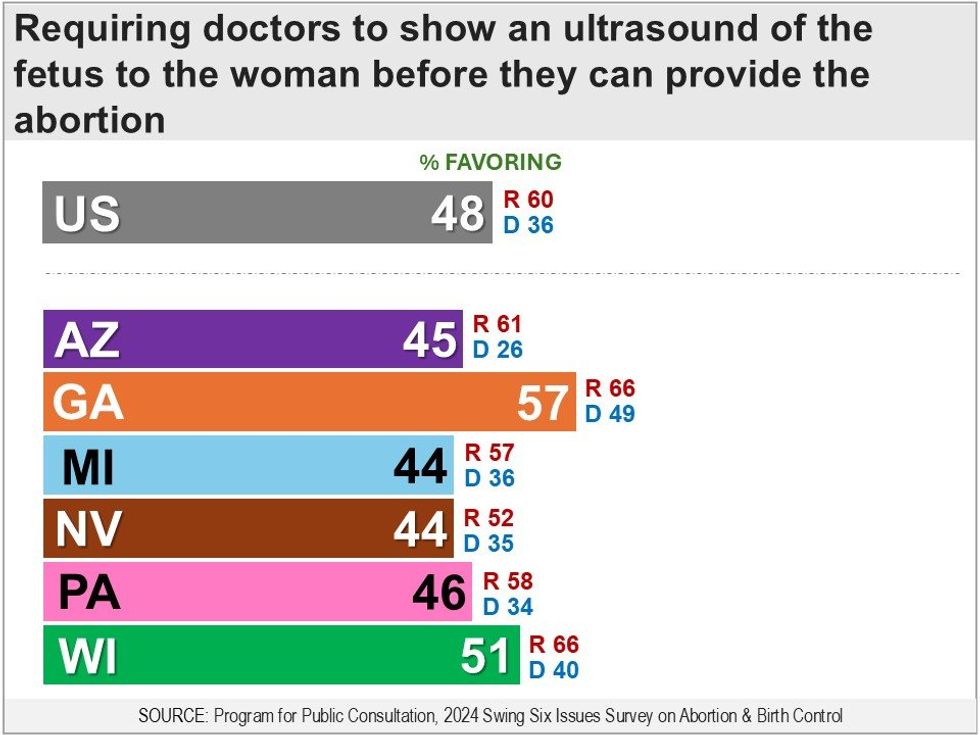 Program for Public Consultation, 2024 Swing Six Issues Survey on Abortion & Birth Control
Program for Public Consultation, 2024 Swing Six Issues Survey on Abortion & Birth Control
Requiring a waiting period of 1-3 days before receiving an abortion is supported by a majority only in Georgia (54 percent), by half in Michigan and Wisconsin, and by less than half in Arizona, Nevada and Pennsylvania (43 percent to 48 percent). Among Republicans, majorities in five of the swing states are in favor (58 percent to 67 percent), but just under half in Nevada (49 percent). Among Democrats in the swing states, just 31 percent to 44 percent are in favor. Nationally, 44 percent are in favor (Republicans, 59 percent; Democrats, 33 percent) and 54 percent opposed.
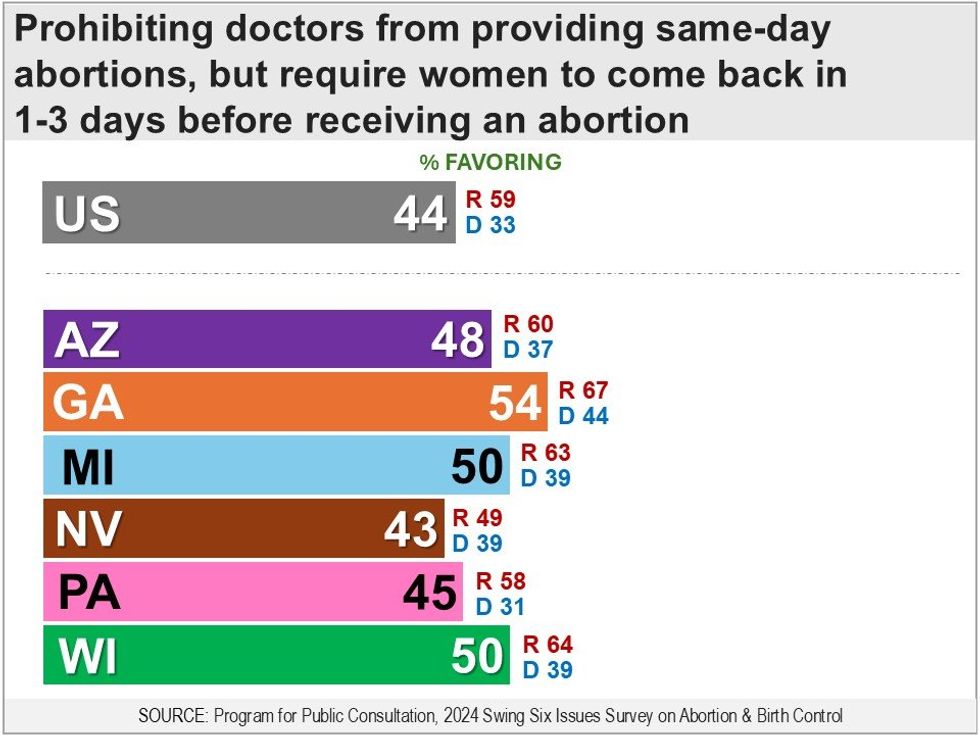 Program for Public Consultation, 2024 Swing Six Issues Survey on Abortion & Birth Control
Program for Public Consultation, 2024 Swing Six Issues Survey on Abortion & Birth Control





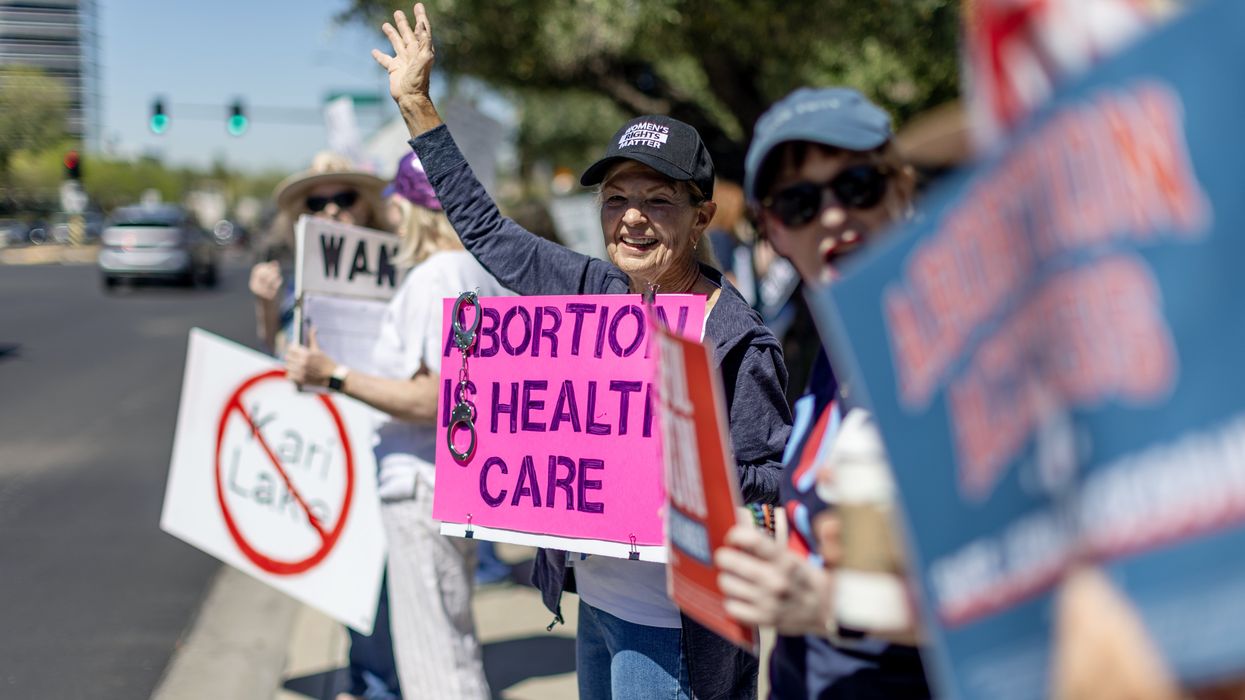

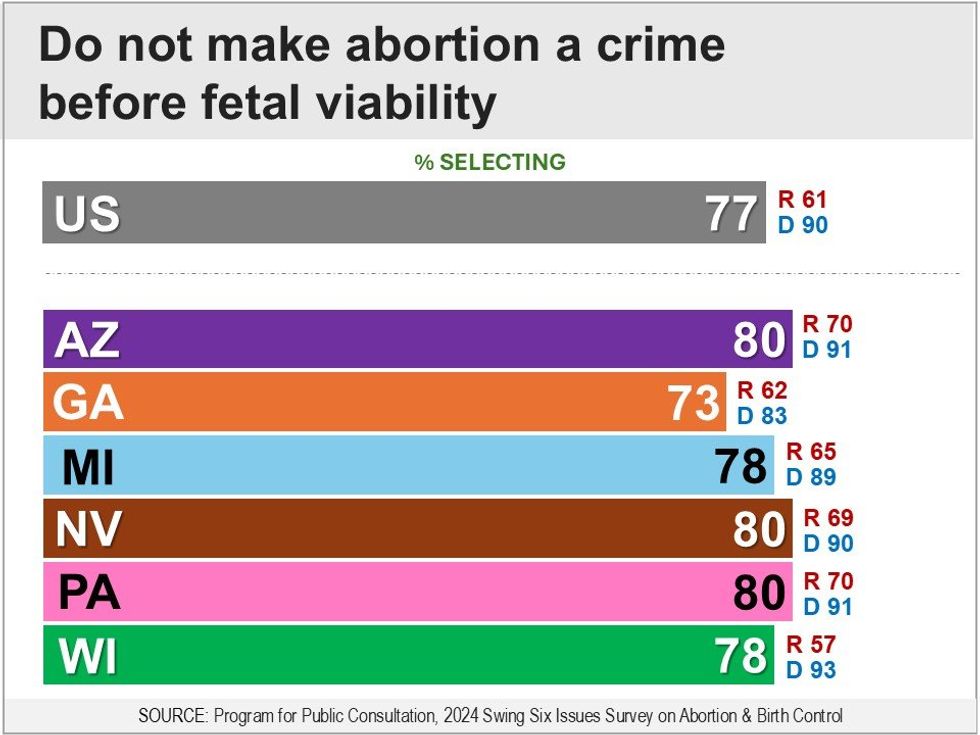
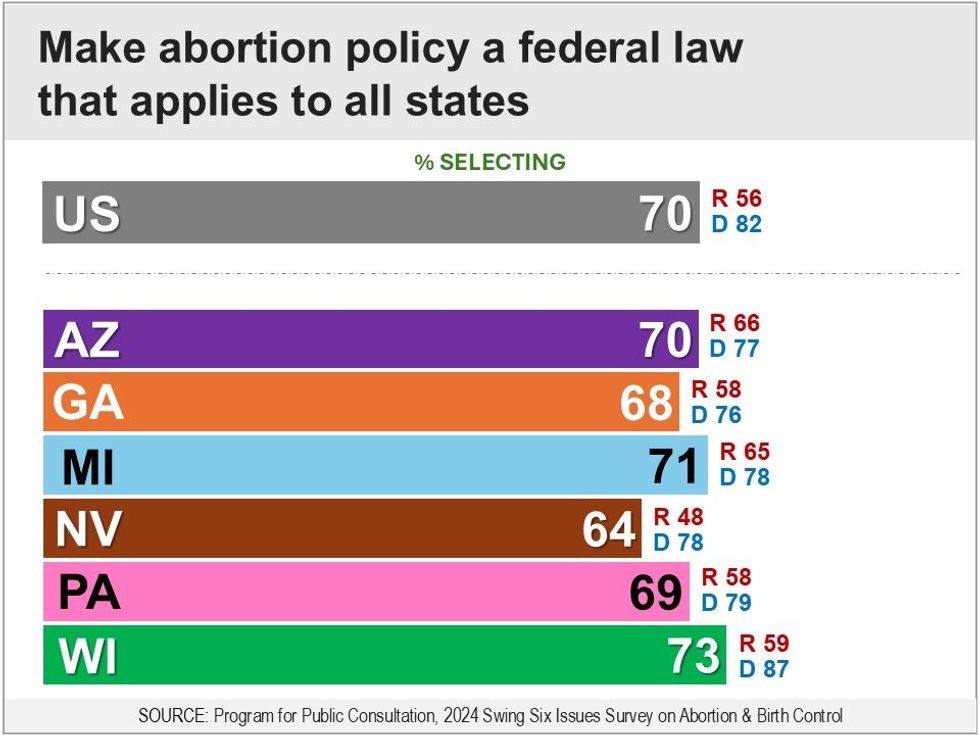
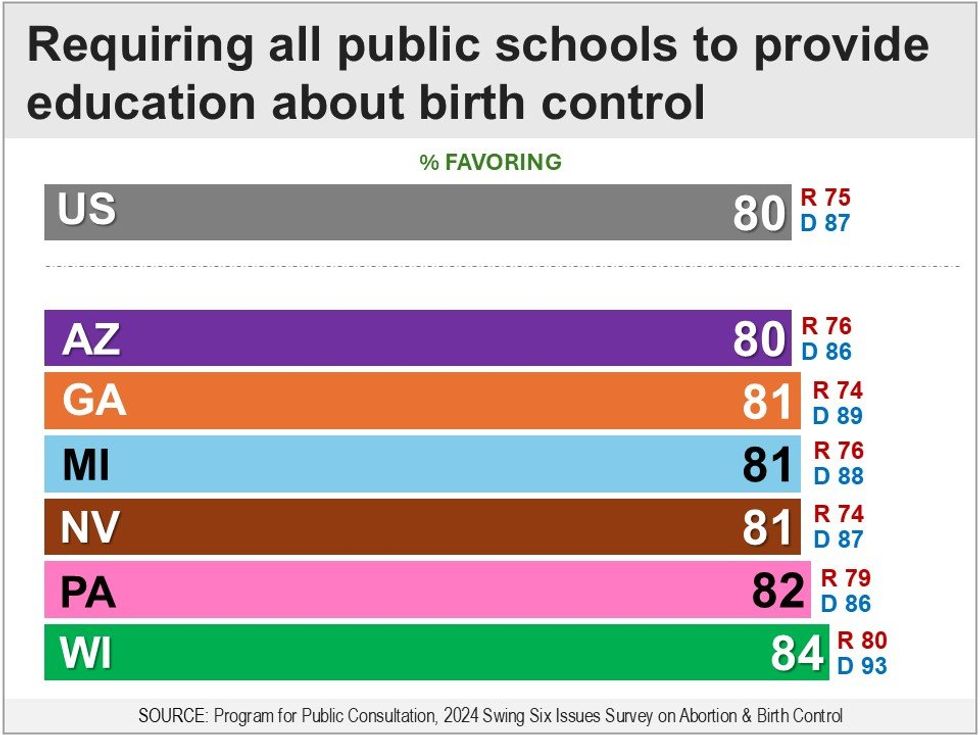
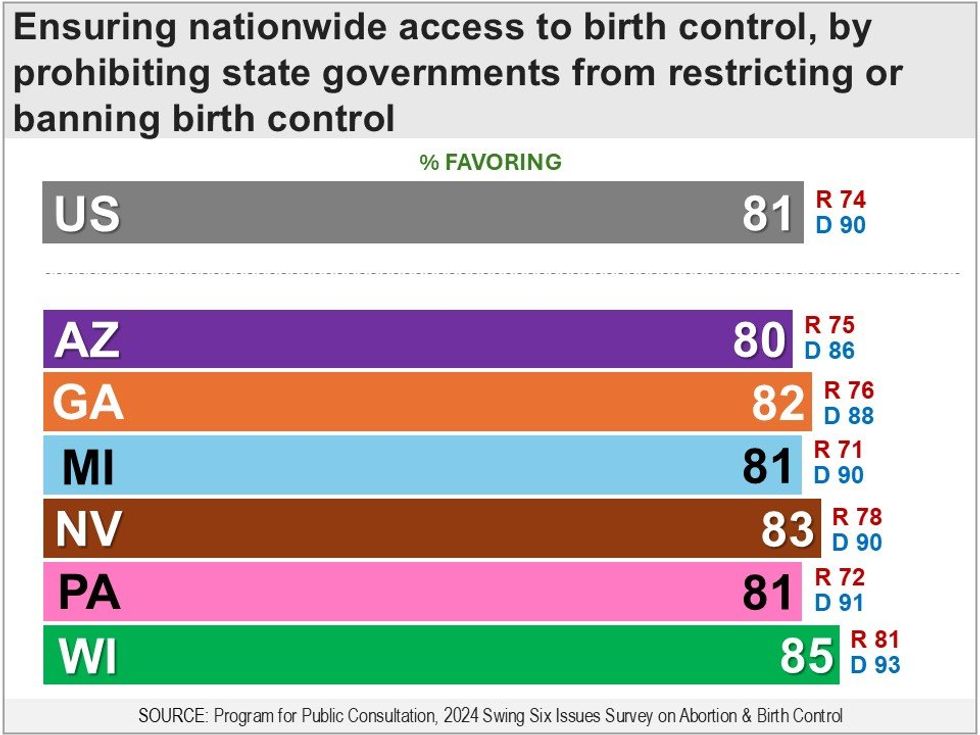













 From left to right: Gabriel Cardona-Fox, Bud Branch, Joe Concienne
From left to right: Gabriel Cardona-Fox, Bud Branch, Joe Concienne 